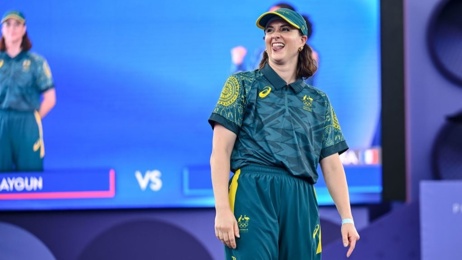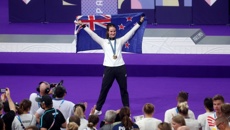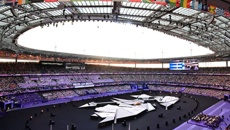By Michael Burgess in Paris
For Lucy Spoors and Brooke Francis, it didn’t take long for the tears to come.
They were only three minutes into their media interviews – after their remarkable gold medal triumph in the women’s doubles sculls on Thursday – when the eyes began to well up. And with good reason.
As they stood on the banks of the Vaires-sur-Marne Nautical Stadium – 20km to the east of Paris – there would have been so much going through their minds.
The “super mums” were Olympic champions, after the most unlikely journey. They only first raced together as a combination just over 12 months ago and hadn’t won an event in that time. There were the sleepless nights, the doubts and the fear of the unknown, as the first mothers on New Zealand’s elite rowing programme.
There was the breastfeeding at competitions and training and the constant struggle to balance energy output and nutrition. And they had to find synergy off and on the water, against combinations that had much more experience together. Somehow, they did it.
“Raising kids isn’t easy,” reflected Francis as the tears came down. “It takes a village and we have had that whole village behind us this whole way and it only makes it that much more special. The fact that our families are here and our kids get to see this legacy now is going to be so special.”
Lucy Spoors and Brooke Francis are women’s double scull Olympic champions. Photo / Steve McArthur, Photosport
Francis gave birth to daughter Keira in September 2022, while Spoors welcomed son Rupert into the world in December of the same year. Their unique situation had garnered support across the rowing world. A group of Australian fans in the packed grandstands on Thursday were cheering wildly for the Kiwis, explaining it was “because they are Mums” and that theme has been echoed in correspondence to the duo.
“We have had a lot of messages from competitors and other teams saying that we really respect what you are doing,” said Spoors. “[Saying] we want to say thanks because we haven’t seen it done much in our sport and we really respect that you are giving it a nudge and we hope you go well.”
While they didn’t know what to expect when they rejoined the rowing programme – after both had won silvers in Tokyo (Spoors in the eights and Francis in the double sculls) they insist they were aiming high from the start, rather than just having a go.
“Honestly, if we are being true to ourselves, [gold] was the dream,” said Spoors. “Rowing is too hard to not have the big dream. The training was too tough to commit to that without having something that was driving us every day. When it looked like we weren’t going to be here, when we were getting a lot of fifths, there has been a lot of underlying belief because Brooke has been doing exactly the same as me. We know what each other has been going through so that has been a real driving force underneath it all, we have had to build belief in each other.”
Getting to the start line was one thing – barely two years since their progeny arrived – but they also found their best race, when it mattered most. There have been many spine tingling moments in New Zealand rowing down the years, with 29 Olympic medals including 14 golds ahead of Paris but few better than this.
They beat the world and Olympic champions, the superstar Romanian duo of Ancuta Bodnar and Simona Radis, putting the hammer down with 700m to go and then hanging on, despite a final push from the Europeans, in a breathless finish.
The race plan was executed superbly. They were patient from the start, half a boat length back after 500m and then 1.52 seconds behind the leaders at the halfway point.
“We were just taking it stroke by stroke,” said Francis. “A final is the kind of race where you can get caught out if you are too busy thinkjng about the medals before you have actually put the strokes in.”
They stayed composed, before lifting the intensity. It was also an exhibition of great technique, as the Romanian stroke rate remained higher, but the Kiwi oars were smooth and steady through the water as they overtook their rivals.
With 500m to go they were in front – by a margin of 0.25 seconds – and had momentum. They pushed more – with a tangible advantage – before one final twist, as the Europeans found another gear.
At that moment, their minds drifted back 12 years, to the men’s double sculls of Joseph Sullivan and Nathan Cohen and their herculean sprint in the final stages to take gold in London.
“A lot of people who were experienced rowers had said to us it is going to be tight and we knew it was going to be tight,” said Francis. “So in the last 200m I just put my head down and thought, ‘this has to be like Joe and Nathan’, [the strokes] have got to be short and they’ve got to be punchy.”
It was fraught – as the Romanians also lifted in the last 150m – but the New Zealanders defied the pain barrier to find a final surge and hang on, crossing the line in 6:50.45, less than a quarter of a second (0.24s) ahead.
“All we were thinking about was just being brave and we were brave from the start,” said Spoors.
After further emotion in the medal ceremony it was time to focus on Keira and Rupert, with motherhood likely to be the overwhelming priority for the next few months at least.
“They are looking forward to getting their mums back,” laughed Francis
Follow the podcast on iHeart Radio
Take your Radio, Podcasts and Music with you









